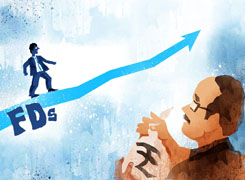Dear sir... Am Ravi kumar. age- 33. Am doing SIP, and investing in PPF. in my EPF account i have 2.5 lakhs. I want to withdraw 1 lakh ruppes from EPF and invest into index funds for my retirement. Is it good idea sir ?
Ans: Dear Ravi Kumar,
Thank you for your question. Your initiative in managing your finances at 33 is commendable. Let’s delve into the intricacies of your plan to withdraw Rs 1 lakh from your EPF to invest in index funds and explore a more advantageous approach.
Current Financial Landscape
Firstly, it’s great to see that you are already engaged in systematic investment plans (SIPs) and contributing to your Public Provident Fund (PPF). These steps lay a solid foundation for long-term financial stability.
Systematic Investment Plans (SIPs): SIPs help inculcate disciplined investing and take advantage of rupee cost averaging. This can potentially yield good returns over time.
Public Provident Fund (PPF): PPF is a secure investment option offering tax-free returns and benefits under Section 80C of the Income Tax Act. It’s an excellent vehicle for building a retirement corpus.
Employees’ Provident Fund (EPF): EPF provides a guaranteed return with tax benefits. It’s a secure way to save for retirement, offering compounding benefits over the long term.
The Proposal to Withdraw from EPF
You plan to withdraw Rs 1 lakh from your EPF account, which currently has Rs 2.5 lakhs. The idea is to invest this amount into index funds for your retirement. While this shows proactive thinking, it’s crucial to assess the pros and cons before proceeding.
Evaluating Index Funds
Index Funds: These funds replicate the performance of a specific index (e.g., Nifty 50 or Sensex). They offer broad market exposure and are generally low-cost due to passive management.
Advantages of Index Funds:
Low Expense Ratios: Index funds have lower management fees compared to actively managed funds.
Broad Market Exposure: They provide diversification by investing in a wide range of stocks within the index.
Simplicity: Investing in index funds is straightforward and easy to understand.
Disadvantages of Index Funds:
Lack of Flexibility: Index funds strictly follow the index composition, missing out on opportunities to outperform.
Average Returns: Since they mimic the index, their returns are average, which means they can’t beat the market.
Downside During Market Corrections: Index funds reflect the market downturns directly without any active management to mitigate risks.
Advantages of Actively Managed Funds
Active Management: Actively managed funds are handled by professional fund managers who aim to outperform the market through strategic asset allocation and stock picking.
Benefits of Actively Managed Funds:
Potential for Higher Returns: Fund managers use their expertise to select stocks that can outperform the market.
Flexibility: Managers can adjust the portfolio to take advantage of market opportunities or mitigate risks.
Downside Protection: Active management can help reduce the impact of market downturns through strategic asset allocation.
The Power of Professional Management
Investing through actively managed funds can offer a more dynamic approach. Professional fund managers analyze market trends, company fundamentals, and economic indicators to make informed decisions, potentially leading to better returns.
Comparing Risk and Reward
When choosing between index funds and actively managed funds, it’s essential to consider your risk tolerance and financial goals. While index funds offer simplicity and lower costs, actively managed funds can provide tailored strategies to navigate market volatility.
The Long-Term Perspective
For retirement planning, a long-term investment horizon is critical. Actively managed funds can adapt to changing market conditions, potentially providing better risk-adjusted returns over time.
Investment Strategy and Diversification
Diversification: Spreading your investments across different asset classes and sectors can mitigate risks. Actively managed funds offer diversified portfolios, reducing the impact of poor performance in any single asset or sector.
Regular Monitoring: Unlike index funds, actively managed funds require regular monitoring and rebalancing, ensuring your investments remain aligned with your financial goals.
Tax Efficiency
Consider the tax implications of withdrawing from EPF and investing in mutual funds. While EPF offers tax-free returns at maturity, investments in mutual funds are subject to capital gains tax. Long-term capital gains (LTCG) tax on equity mutual funds is 10% on gains exceeding Rs 1 lakh in a financial year.
Emergency Fund Considerations
Before diverting funds from EPF, ensure you have an adequate emergency fund. This should cover at least 6 months of your living expenses, providing a financial cushion in case of unexpected events.
Evaluating Current Financial Commitments
Assess your existing financial commitments and cash flow. Ensure that diverting funds from EPF doesn’t impact your ability to meet essential expenses or service debts.
Consulting a Certified Financial Planner
While the information provided here aims to guide your decision, consulting with a Certified Financial Planner (CFP) can offer personalized advice. A CFP can help you design a comprehensive investment strategy tailored to your risk profile, financial goals, and time horizon.
Reassessing Retirement Goals
Reevaluate your retirement goals and investment strategy periodically. Adjust your investment mix based on changing financial circumstances, market conditions, and retirement timelines.
Final Insights
Withdrawing Rs 1 lakh from EPF to invest in actively managed funds can be a wise decision if done strategically. Actively managed funds offer potential for higher returns, professional management, and flexibility to navigate market volatility. Ensure your investment decisions align with your long-term financial goals, risk tolerance, and liquidity needs. Consulting a Certified Financial Planner can provide tailored advice to optimize your investment strategy for a secure retirement.
Best Regards,
K. Ramalingam, MBA, CFP,
Chief Financial Planner,
www.holisticinvestment.in















